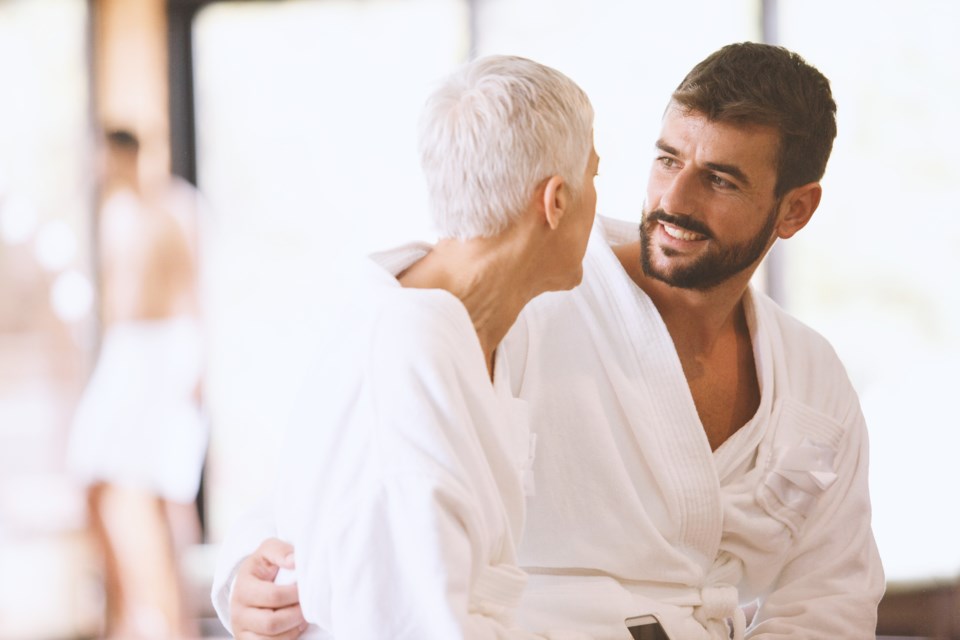Dear Lisi: My mother-in-law keeps getting married and her husbands keep getting younger and younger. At first it didn’t bother me, but now three husbands and two decades later, I’m older than my new step-father-in-law, and it’s just awkward.
My mother-in-law is a very unique woman, a power house with incredible energy, humour and intellect. She runs a company she started many years ago and is still very involved. She and I get along extremely well, and she is very close with my wife, her daughter.
She’s an involved and engaged grandmother to our three kids and has an active social life. My wife’s father is also a solid figure in our lives, and fortunately he and his ex are friendly.
I didn’t have a problem with her last husbands, but this one just rubs me the wrong way, and part of it is due to his age. I don’t trust him, and she knows it.
I don’t want to offend her or damage our relationship, but I just can’t be warm and fuzzy to Hubby #3.
Skeptical son-in-law
My advice depends on how everyone else feels only because I can’t get a good read on the new husband. If everyone else in this extended family like him and think he’s decent, maybe it is just a question of you feeling your age. I’ll be honest, in that way, I’m also traditional and can empathize with you feeling awkward with a younger step-father-in-law.
But if you’re not the only one sensing something is amiss, maybe you need to have a family round table without your mother-in-law and her new partner present. From your longer letter, it sounds like money could be a factor in all of this.
FEEDBACK regarding the university student whose friend is afraid of everything (Oct. 7):
“It sounds to me like this first-year university student is experiencing signs of paranoia/OCD (fear of bed bugs, food poisoning, robbery). This young lady is showing definite signs of having a mental illness and should be supported by this concerned friend in seeking professional medical support, perhaps at the university medical centre.
“She definitely should not start to slowly pull away from her fearful friend. It is vital to be aware of mental health issues. For example, symptoms of schizophrenia are often first manifested at this young age. We all need to take responsibility to help those in need.”
Concerned reader
Lisi — You are correct in your final statement that we all need to take responsibility to help those in need. Thank you for your feedback.
Dear Lisi: My sister has a cat. I’m not a cat person because I have been highly allergic my entire life. We never had any pets growing up because of my allergy and our father’s allergy to dogs.
My mother and sister both love pets but accepted the situation. My father died and my mom got a dog. He’s the sweetest, and we all love him.
When my sister moved out, she immediately got a cat. It sheds like crazy so my sister is always covered in cat hair. The problem is that I can’t even be around her without sneezing uncontrollably.
How do I explain this to her without hurting her feelings?
Sneezing Sissy
Research shows that the most common cat allergies are caused by Fel d 1, which is produced by all cats, including hypoallergenic cats. And that high-shedding cats, such as Persians, Manx, and Himalayans, are worse for people with allergies because the allergens get caught in the cat’s hair and then spreads wherever the fur flies.
Explain this to your sister, and hope for the best.
FEEDBACK regarding the grandparents who don’t understand their gay grandson (Oct. 17):
“Lisi, your advice sounds reasonable, but it will not be enough. This is obvious since, according to “Protective Dad,” the grandparents continue to say inappropriate things, make odd comments and hurt the boy’s feelings.
“The grandparents will obviously be older and likely raised in an era where discussing these types of things was taboo and only whispered about or ridiculed.
“Protective Dad” needs professional help to learn how to deal, in a loving but firm manner, with his parents. They may never accept the fact that their grandson is gay, or even understand the concept fully, but the father needs the tools to help them understand that making inappropriate or odd comments is hurting the boy’s feelings and is likely to ruin their loving relationship with their grandchild, as well as the rest of the family.”
Lisi – I agree that discussing this issue with a professional will hopefully help this family.
Ellie Tesher and Lisi Tesher are advice columnists for the Star and based in Toronto. Send your relationship questions via email: [email protected].




